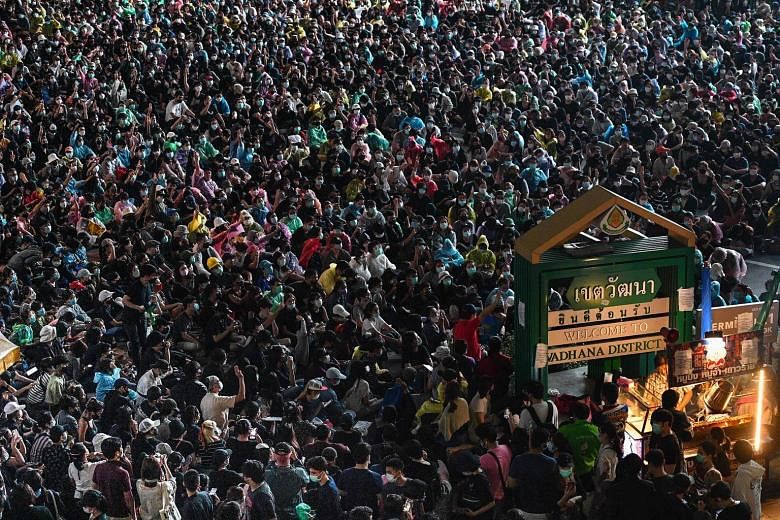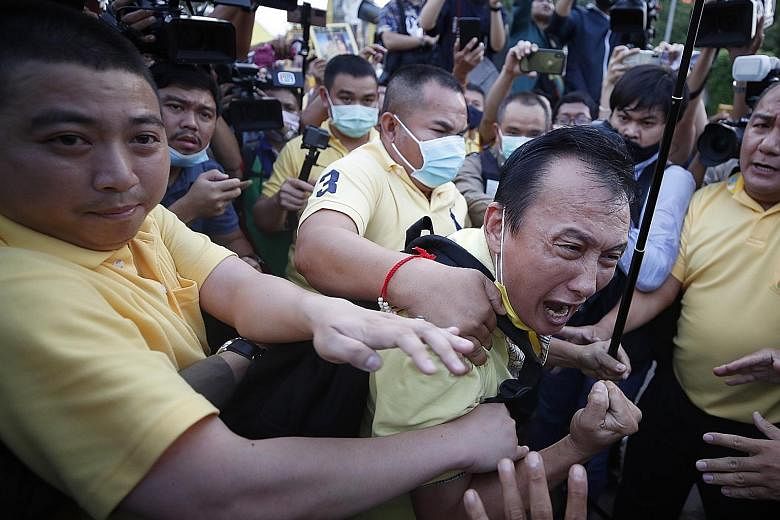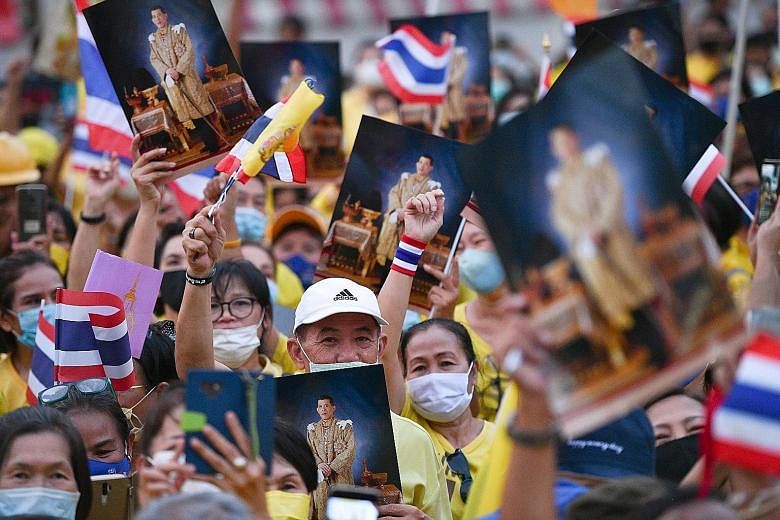BANGKOK • Thai Prime Minister Prayut Chan-o-cha yesterday revoked an emergency decree aimed at quelling pro-democracy protests after the authorities failed to stamp out daily rallies demanding his resignation and reform of the unassailable monarchy.
The Royal Gazette, the government mouthpiece, reported that the emergency measures were lifted at 12pm, local time.
"All conditions set under the severe state of emergency have been stopped," it said.
Thailand's student-led pro-democracy movement has been gaining momentum since mid-July, with mostly young demonstrators calling for Mr Prayut's removal and a rewriting of the 2017 military-scripted Constitution.
Some protest leaders have also issued controversial demands to reform the ultra-powerful and wealthy monarchy, whose influence permeates every aspect of Thai society.
The "severe" emergency measures were imposed last week after protesters flashed a three-finger salute at a royal motorcade - an unprecedented challenge to the monarchy.
Besides banning gatherings of more than four people, the measures gave the police carte blanche to arrest protesters and seize electronic materials believed to threaten national security - a move that has drawn widespread public condemnation.
But the ban failed to discourage the tens of thousands who have amassed daily around major Bangkok intersections to call for Mr Prayut to step down.
The former military chief - who masterminded the 2014 coup and has held on to power since - had indicated late on Wednesday that he was preparing to lift the state of severe emergency.
Mr Prayut said in a televised address on Wednesday night that the country must "step back from the edge of the slippery slope that can easily slide to chaos".
"I will make the first move to de-escalate this situation," he said.
But the anti-government protesters appeared to reject the olive branch that the Premier was offering, giving him three days to resign and meet other key demands including reforming the monarchy.
Thousands of demonstrators on Wednesday night broke through police barricades and barbed wire to march towards his official office, and gathered near the building, known as Government House.
"We submitted the letter for Prayut to resign, which is one of our three demands," Free Youth, one of the main protest organisations, said in a Facebook post.
"If the government doesn't give an answer within three days, the people will return with higher demands than before."
Mr Prayut has struggled to stem the mounting street demonstrations, which have used Hong Kong-style pop-up rallies to avoid police and defy the emergency decree.
The government has shown no signs of meeting the protesters' demands, which would upend the royalist elite that has maintained power throughout much of Thailand's history, but it has also sought to avoid bloodshed that could further roil the economy.
The demonstrations, too, show no signs of letting up, and have even started to spread to other parts of Thailand.
They have broken long-held taboos about publicly criticising the royal family, with demands for the monarch to no longer endorse coups, provide transparency in how funds are spent, and get rid of laws that stifle discussion of the royal family.
Simultaneous rallies by pro-royalist groups in support of King Maha Vajiralongkorn also raised fears of clashes between the rival groups. Past protest movements in Thailand have ended in bloody crackdowns, most recently in 2010.
Thailand has seen more than a dozen coups since the end of royal absolutism in 1932, the latest in 2014. Its arch-royalist army, which positions itself as a protector of the monarchy, claims that such interventions are necessary to protect the king.
Parliament - which is in recess - has been recalled for a special session next Monday in a bid to resolve the crisis.
Mr Prayut urged the protesters to trust the parliamentary process to address their grievances and said the government and the activists should "each take a step back" and "find solutions to the problems".
"The only sure way to achieve a sustainable, enduring resolution to the problems is to speak to each other, respect the due process of law, and then let the will of the people be resolved in Parliament," he said. "That is the only way."
Thailand's protests are underpinned by years of sluggish growth now exacerbated by the coronavirus pandemic, which has put the Thai economy on course for its worst performance ever by derailing the two main drivers: tourism and trade.
The country's benchmark SET Index of stocks has dropped 23 per cent this year. "While the political situation has so far been under control, the lingering protests do not bode well for the Thai economic recovery," said Mr Tim Leelahaphan, an economist at Standard Chartered Bank in Bangkok.
AGENCE FRANCE-PRESSE, BLOOMBERG



